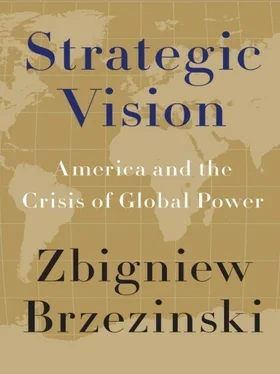Zbigniew Brzezinski - Strategic Vision - America and the Crisis of Global Power
Здесь есть возможность читать онлайн «Zbigniew Brzezinski - Strategic Vision - America and the Crisis of Global Power» весь текст электронной книги совершенно бесплатно (целиком полную версию без сокращений). В некоторых случаях можно слушать аудио, скачать через торрент в формате fb2 и присутствует краткое содержание. Город: New York, Год выпуска: 2012, ISBN: 2012, Издательство: Basic Books, Жанр: Публицистика, на английском языке. Описание произведения, (предисловие) а так же отзывы посетителей доступны на портале библиотеки ЛибКат.
- Название:Strategic Vision: America and the Crisis of Global Power
- Автор:
- Издательство:Basic Books
- Жанр:
- Год:2012
- Город:New York
- ISBN:9780465029556
- Рейтинг книги:4 / 5. Голосов: 1
-
Избранное:Добавить в избранное
- Отзывы:
-
Ваша оценка:
- 80
- 1
- 2
- 3
- 4
- 5
Strategic Vision: America and the Crisis of Global Power: краткое содержание, описание и аннотация
Предлагаем к чтению аннотацию, описание, краткое содержание или предисловие (зависит от того, что написал сам автор книги «Strategic Vision: America and the Crisis of Global Power»). Если вы не нашли необходимую информацию о книге — напишите в комментариях, мы постараемся отыскать её.
Strategic Vision: America and the Crisis of Global Power — читать онлайн бесплатно полную книгу (весь текст) целиком
Ниже представлен текст книги, разбитый по страницам. Система сохранения места последней прочитанной страницы, позволяет с удобством читать онлайн бесплатно книгу «Strategic Vision: America and the Crisis of Global Power», без необходимости каждый раз заново искать на чём Вы остановились. Поставьте закладку, и сможете в любой момент перейти на страницу, на которой закончили чтение.
Интервал:
Закладка:
A sequential ranking of other major powers beyond the top two would be imprecise at best. Any list, however, has to include Russia, Japan, and India, as well as the EU’s informal leaders: Great Britain, Germany, and France. Russia ranks high geopolitically largely because of its rich stores of oil and gas and its continued status as a nuclear power second only to the United States, though that military asset is diluted by its domestic economic, political, and demographic handicaps, not to mention the fact that from both the east and west it faces economically much more powerful neighbors. Without nuclear weapons or the dependence of some European states on Russian oil and gas, Russia would otherwise not rank very high on the pyramid of global geopolitical power. Economically, it lags significantly behind Japan, and a strategic choice by Japan to pursue a more active international role could elevate it above Russia as a major global player. India, regionally assertive and globally ambitious, is the new entrant into the presumptive top list, but it remains hindered by the strategic antagonism with its two immediate neighbors, China and Pakistan, as well as by its various social and demographic weaknesses. Brazil and Indonesia have already laid claims to participation in global economic decision making within the G-20 and aspire to take regional leadership roles in Latin America and in Southeast Asia, respectively.
The foregoing composition of the current global elite thus represents, as already noted, a historic shift in the global distribution of power away from the West as well as the dispersal of that power among four different regions of the world. In a positive sense, with the self-serving domination of major portions of the world by European powers now a thing of the past, these new realities of power are more representative of the world’s diversity. The days when an exclusive Western club—dominated by Great Britain, France, or the United States—could convene to share global power at the Congress of Vienna, at the Versailles Conference, or at the Bretton Woods meeting, are irrevocably gone. But—given the persistence of historically rooted antagonisms and regional rivalries among the currently more diversified and geographically widespread ten leading powers—this new state of affairs also highlights the increased difficulty of consensual global decision making at a time when humanity as a whole is increasingly confronting critical challenges, some potentially even to its very survival.
It is far from certain how enduring that new convent of leading states will prove to be. One should be mindful of the fact that in the course of only one century—from approximately 1910 to 2010—the ranking hierarchy of global power changed significantly no less than five times, with all but the fourth signaling a divisive deterioration in the global preeminence of the West. First, on the eve of World War I the British and French empires were globally dominant and were allied to a weakened Tsarist Russia recently defeated by a rising Japan. They were being challenged from within Europe by the ambitious imperial Germany supported by a weak Austro-Hungarian and declining Ottoman empires. An industrially dynamic America, though initially neutral, made in the end a decisive contribution to the Anglo-French victory. Second, during the interlude between World War I and World War II, Great Britain seemed internationally preeminent, though with America clearly on the rise. However, by the early 1930s the rapidly rearming and increasingly revisionist Nazi Germany and Soviet Russia were already plotting against the status quo. Third, Europe was shattered by World War II, which produced in its wake the forty-year-long Cold War between the American and Soviet superpowers, the might of each overshadowing everyone else. Fourth, the ultimate “defeat” of the Soviet Union in the Cold War led to a brief unipolar phase in world affairs dominated by America as the sole global superpower. And, fifth, by 2010, with America still preeminent, a new and more complex constellation of power containing a growing Asian component was visibly emerging.
FIGURE 1.1 DECLINING IMPERIAL LONGEVITY

The high frequency of these power shifts signals a historical acceleration in the changing distribution of global power. Prior to the twentieth century, global preeminence by a leading state generally lasted for a century or so. But as conscious political activism became an increasingly widespread social phenomenon, politics became more volatile and global preeminence less enduring. The fact that the West remained globally dominant during the entire twentieth century should not obscure the fact that conflicts within the West undermined its once-dominant position.
Indeed, even today the uncertainty regarding the durability of America’s current international leadership, the end of Europe’s central role in world affairs as well as the EU’s political impotence, Russia’s nostalgia for a leading global role that it is incapable of exerting, the speculation that China before long might be ascending to global primacy, India’s impatient ambition to be seen as a world power and its external as well as internal vulnerabilities, and Japan’s lingering reluctance to translate its global economic weight into political assertiveness collectively reflect the reality of a more broadly based but less cohesive global leadership.
3: THE IMPACT OF GLOBAL POLITICAL AWAKENING
The ongoing dispersal of global power is furthered by the emergence of a volatile phenomenon: the worldwide political awakening of populations until recently politically passive or repressed. Occurring recently in Central and Eastern Europe and lately in the Arab world, this awakening is the cumulative product of an interactive and interdependent world connected by instant visual communications and of the demographic youth bulge in the less advanced societies composed of the easy-to-mobilize and politically restless university students and the socially deprived unemployed. Both groups resent the richer portions of humanity and the privileged corruption of their rulers. That resentment of authority and privilege is unleashing populist passions with unprecedented potential for generating large-scale turmoil.
The universal scope and the dynamic impact of this new social phenomenon is historically novel. For most of history, humanity has lived not only in compartmentalized isolation but also in a state of political stupor. Most people in most places were neither politically conscious nor politically active. Their daily lives were focused on personal survival in conditions of physical and material deprivation. Religion offered some solace while social traditions provided some degree of cultural stability and occasional collective relief from the hardships of fate. Political authority was remote, often seen as an extension of divine will, and frequently legitimated by hereditary entitlement. Struggles for power at the top tended to be confined to a narrow circle of participants, while group conflicts with adjoining communities focused largely on territorial or material possessions and were fueled by instinctive ethnic hatreds and/or divergent religious beliefs. Political conversations, political convictions, and political aspirations were a preoccupation of a privileged social stratum in the immediate vicinity of the ruler itself.
As societies became more complex, a distinctive class of people engaging in political discourse and in struggles for political power emerged at the apex of organized society. Whether in the court of the Roman or of the Chinese emperor, the courtiers or mandarins were active crypto-politicians, though focused more on palace intrigues than on wider policy issues. And as societies evolved even further and literacy increased, more participants entered the political dialogue: the landed aristocracy in the rural areas, wealthy merchants and artisans in the expanding towns and cities, and a limited elite class of intellectuals. Still, the populace at large remained politically disengaged and dormant, except for periodic outbreaks of violent but largely anarchistic outrage, as in the case of peasant uprisings.
Читать дальшеИнтервал:
Закладка:
Похожие книги на «Strategic Vision: America and the Crisis of Global Power»
Представляем Вашему вниманию похожие книги на «Strategic Vision: America and the Crisis of Global Power» списком для выбора. Мы отобрали схожую по названию и смыслу литературу в надежде предоставить читателям больше вариантов отыскать новые, интересные, ещё непрочитанные произведения.
Обсуждение, отзывы о книге «Strategic Vision: America and the Crisis of Global Power» и просто собственные мнения читателей. Оставьте ваши комментарии, напишите, что Вы думаете о произведении, его смысле или главных героях. Укажите что конкретно понравилось, а что нет, и почему Вы так считаете.











